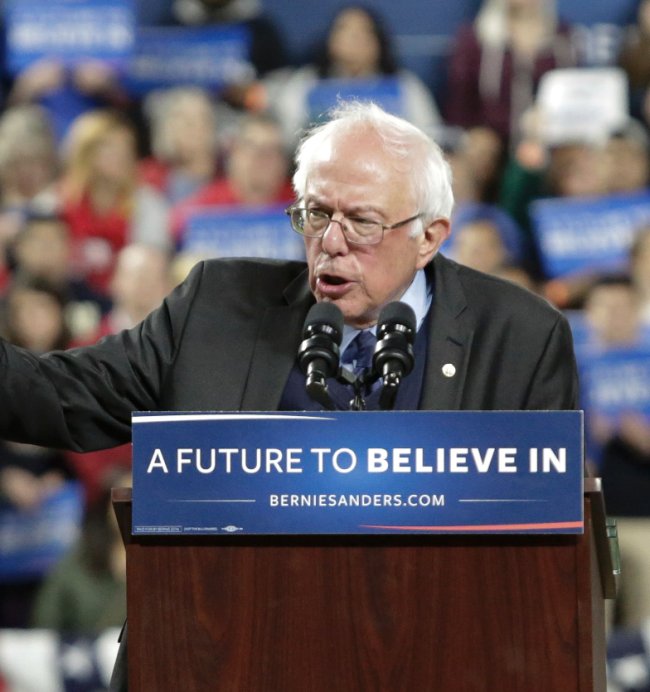Bernie Sanders made a clean sweep of Democratic election contests in Alaska, Hawaii and Washington, although he barely dented the formidable lead enjoyed by frontrunner Hillary Clinton in the battle for the party's presidential nomination.
US news networks showed Sanders winning by wide margins Saturday's caucus votes in all three western states.
US news networks showed Sanders winning by wide margins Saturday's caucus votes in all three western states.

In Washington -- the biggest prize with 101 delegates up for grabs -- Sanders won with an estimated 72.1 percent, against 27.7 for Clinton.
In Hawaii, 71 percent of Democratic caucus-goers supported Sanders, against 29 percent for Clinton.
In Alaska, Sanders' margin of victory was 79.2 percent, against 20.8 percent for Clinton.
The 74-year-old Vermont senator celebrated his victories via Twitter late Saturday.
"Thank you, Alaska! Together we are sending a message that this government belongs to all of us," he wrote.
"Washington, thank you for your huge support! It is hard for anybody to deny that our campaign has the momentum."
Sanders maintains he has a path to winning the nomination and is plowing ahead state by state, ahead of another round of primary and caucus contests next month.
But the delegate math still dramatically favors Clinton, who headed into Saturday's contests with a big lead among pledged delegates and an even larger advantage when party officials known as "superdelegates" are factored into the equation.
At a campaign rally in the midwestern state of Wisconsin, Sanders declared -- despite pundits' negative predictions -- that the tide was now turning in his favor.
"We knew things were going to improve as we headed west," he said to cheers.
"We are making significant inroads in Secretary Clinton's lead and we have... a path toward victory."
"This is what momentum is about," Sanders told his supporters.
"Don't let anybody tell you we can't win the nomination or win the general election. We're going to do both of those things."
Going into Saturday, Clinton had already amassed 1,711 delegates, including super-delegates who are unelected by voters, compared to 952 for Sanders, according to a CNN count.
To win the Democratic nomination at the July convention in Philadelphia,
2,383 delegates are needed.
Sanders has drawn strong support from voters with a populist message that rails against police brutality, a too-low minimum wage, soaring student debt and other societal ills.
In particular, millennials and first-time voters have been flocking to Sanders's message of economic equality, universal health care, and his call to reduce the influence of billionaires on the campaign finance system.
"Real change historically always takes place from the bottom on up when millions of people come together," Sanders said to applause and cheers from a crowd Friday in the Seattle's Safeco Field baseball stadium.
"We need a political revolution!"
He repeated that same message on Saturday in Wisconsin, the next state to hold primaries, on April 5.
Sanders faces an uphill battle in the delegate race, in large part because Democrats allocate delegates proportionally by state, making it all but impossible to overtake Clinton.
The former first lady, meanwhile, appears to already have shifted her focus toward November's general election.
Clinton delivered a somber counterterrorism speech Wednesday in the aftermath of the deadly attacks in Brussels, using it as an opportunity to launch vigorous assaults on Trump and US Senator Ted Cruz and warn their "reckless" foreign policies would harm US interests.
"We need to rely on what actually works, not bluster that alienates our partners and doesn't make us any safer," she said.
Saturday's three contests were caucuses, essentially neighborhood meetings where voters can discuss political platforms and debate the merits of the candidates.
Since they generally require voters to show up in person rather than mailing primary ballots, the format favors Sanders, whose supporters have consistently shown more grassroots enthusiasm.
A series of recent polls has shown Sanders consistently doing better than Clinton against Trump, Cruz or Ohio governor John Kasich -- the three Republicans who remain in the hunt for their party's nomination.
Sanders' prodigious fundraising apparatus gives him the ability to remain in the race through this summer's convention -- whether or not he has a realistic shot at the nomination.
According to RealClearPolitics poll averages, in the remaining states with the three largest delegate allocations -- California, New York and Pennsylvania -- Clinton leads Sanders by nine points, 34 points and 28 points respectively. (AFP)









![[Kim Seong-kon] Democracy and the future of South Korea](http://res.heraldm.com/phpwas/restmb_idxmake.php?idx=644&simg=/content/image/2024/04/16/20240416050802_0.jpg&u=)







![[KH Explains] Hyundai's full hybrid edge to pay off amid slow transition to pure EVs](http://res.heraldm.com/phpwas/restmb_idxmake.php?idx=652&simg=/content/image/2024/04/18/20240418050645_0.jpg&u=20240418181020)

![[Today’s K-pop] Zico drops snippet of collaboration with Jennie](http://res.heraldm.com/phpwas/restmb_idxmake.php?idx=642&simg=/content/image/2024/04/18/20240418050702_0.jpg&u=)